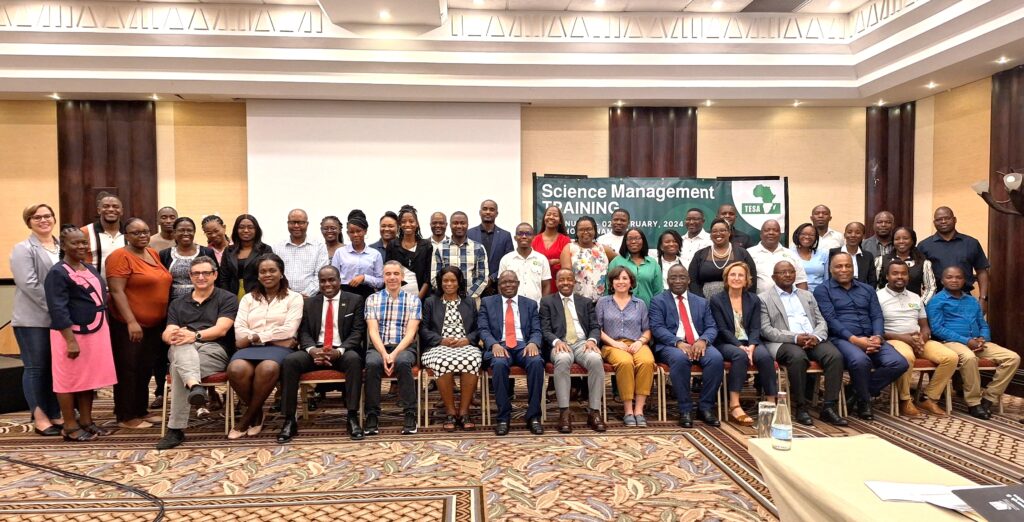
Training in science management was held in Windhoek, the Namibian capital, as part of the TESA III Project (Southern African Network of Excellence for Clinical Trials) for professionals from scientific institutions and project managers. The course lasted five days and aimed to equip participants with tools for managing scientific activities at institutional and inter-institutional level within the scope of the TESA Project.
Organized by the Manhiça Health Research Centre (CISM), in partnership with the University of Namibia (UNAM) and the Barcelona Institute for Global Health (ISGlobal), the training had dynamic sessions that allowed interaction between the participants, facilitators, panelists and guest speakers, which dealt with issues related to Leadership, Management, Governance, Training/Capacity Building, Knowledge Transfer, Programme and Project Management, Financial Management, Responsible Research and Innovation, Good Scientific Practices, Scientific Integrity, among other topics.
In his opening speech, the Director of the University of Namibia Hifikepunye Pohamba and Oshakati Campuses, Jacob Sheehama, after presenting the history of the University of Namibia (founded in 1992), highlighted UNAM’s involvement in the Green Hydrogen Project which illustrates UNAM as a futuristic institution and the adoption of various policies at university level to boost research, ethics and scholarship policy. Sheehama appealed to the participants to also reflect on One-Health in Africa when thinking about the implementation of science management.
For his part, the Director of the Manhiça Health Research Centre, Francisco Saúte, acknowledged the role of CISM, ISGlobal and UNAM in global health research and the challenges they have faced in managing science. “Science management is not just about money for research, but involves managing people, time, space, expectations and emotions,” so “you have to follow a vision, have the spirit of teamwork and the art of listening and communicating,” said Saúte, reminding participants of the opportunity to interact with senior experts and facilitators who attended the event.
The TESA Consortium training programme has supported masters, doctoral and junior researchers who have been trained in the TESA II to continue their research careers in TESA III, with the aim of them becoming future leaders of HIV, tuberculosis and malaria research in their own institutions.
On behalf to ISGlobal, Nuria Casamitjana, Director of Education and Training, said that science management training is part of a set of strategies to meet current challenges in the area of scientific research and that her institution offers several free courses and a Scholarship Programme. In addition, she said, there is a specific programme for strengthening research capacities in low- and middle-income countries.
Teresa Machai Macete, TESA III project manager and head of CISM’s Training Unit, pointed to various training programmes at TESA level, as TESA has training as part of research to increase the capacity to carry out clinical trials in the network’s member countries. “CISM, which is responsible for the capacity-building component, provides scholarships and short courses, workshops and seminars. We also have a mentoring programme to accompany professional careers and student life,” said Teresa, adding that the certification of the CISM Data Centre, which began with TESA II, is also one of the consortium’s focuses.
It is expected that on successful completion of the course, participants will be able to understand scientific governance, management and leadership of research institutions, using different management models and tools, and understand the various success factors and common mistakes for the successful management of scientific projects and programmes in complex and changing environments. In addition, participants should be able to contribute to the strategic planning of their scientific institutions and programmes, as well as research activities, in the context of the dynamics of global funding and collaborations, and apply concepts of responsible research and innovation, good scientific practice and scientific integrity in the context of research institutions, projects, programmes and activities.
TESA is a regional initiative that collaborates with 15 institutions, 12 from southern Africa and 3 from Europe, and is supported by Global Health EDCTP3.


